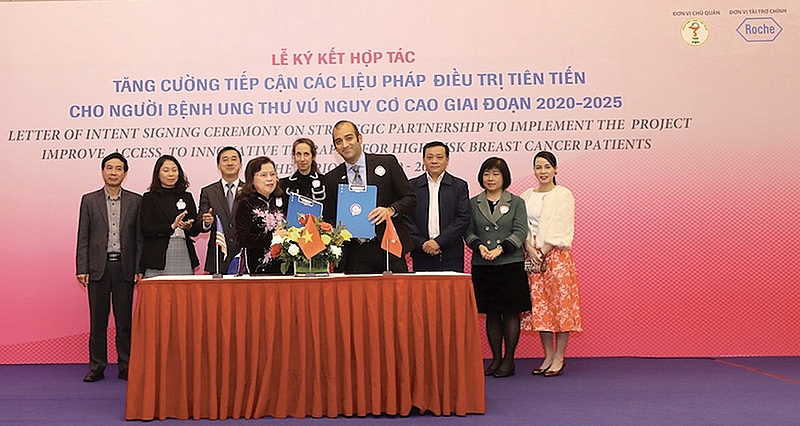Partnership tackles threat of rising breast cancer rates
 |
| It is hoped that focused initiatives will help lower breast cancer rates across the country |
The Vietnam Medical Association (VMA) and Roche Vietnam officially signed on December 8 a strategic partnership to implement the project on improving access to innovative therapies for high-risk breast cancer patients in the 2020-2025 period.
Associate Professor, Dr. Nguyen Thi Xuyen, VMA president stated, “This is the first comprehensive nationwide project in Vietnam dedicated to breast cancer with unprecedented scale and number of partners, all in hope of helping cancer patients. More healthcare professionals (HCPs) can receive customised training to improve their capabilities of diagnosing and treating cancer, thus workload will be reduced for each doctor and the quality of treatment per patient is improved.”
The initiative will focus on raising public awareness about breast cancer, increasing the number of people diagnosed early at participating hospitals, strengthening capacity in breast cancer diagnosis and treatment, and optimising the existing database from the National Cancer Institute and Vietnam Social Security to build a diagnosis and treatment data source.
With the partnership, the VMA expects an overhaul of the healthcare system that offers precise diagnosis and effective treatment as well as better financial support for patients, thus increasing the survival rate.
Rosch Vietnam chief representative Girish Mulye said, “As a global pioneer in pharmaceuticals and diagnostics, Roche is committed to working with Vietnam to address healthcare challenges through a variety of activities. Collaborating and supporting the VMA in this impactful breast cancer project is one of the actions to demonstrate that commitment.”
Mulye added that the project will bring tangible benefits for breast cancer patients in Vietnam by enhancing the healthcare system and capability. “The preparedness for breast cancer and the healthcare system in general would be enhanced when many stakeholders share the same vision and work together,” he added.
According to Mulye, screening will be made more affordable for women. Six hospitals will get further improvements with HCP training and advanced equipment to become centres of excellence for breast cancer.
Moreover, a database across the country will be set up to consolidate data on patients. Roche helps analyse their own data by providing expertise from outside the country and providing funding. “The last pillar is medicines – so when medicines can play a role, we’re trying to increase the accessibility for those most innovative medicines,” Mulye added.
Globally, breast cancer is the most prevalent type of cancer among women and ranks fifth in terms of cancer mortality as a whole. There have been over 15,000 new cases in Vietnam this year and an annual mortality rate of over 6,000, making it the second-most leading cause of death in the country.
Efficient treatment of cancer is increasing today thanks to the advance of medical innovations such as diagnosis techniques, innovative biotech treatments, early screenings, and increased access to better treatments. Yet the country is still under-equipped to prepare for any surge in cancer cases.
“The biggest thing is the detection is so late here, so it is very difficult to have a positive outcome. As new breast cancer cases in Vietnam is forecast to be in an upward trend, such a partnership is more necessary,” Mulye explained.
Addressing the strategic partnership signing event, Prof. Dr. Tran Van Thuan, Deputy Minister of Health said, “In Vietnam, the government has issued Decision No.376/QD-TTg on the national strategy to prevent and treat non-communicable diseases like cancer, heart disease, and diabetes. The project is a result of close cooperation between key stakeholders at government levels, medical institutions, major hospitals, and Roche Vietnam.”
And as the key stakeholders in the project, Roche has been supporting the country in this journey with the commitment to improving breast cancer care in Vietnam since 2013.
Back then, with the “We care for her” programme, Roche started improving awareness of breast cancer for the public, and sponsored breast cancer screenings across nine different provinces. Over 40,000 patients were screened and HCP training was carried out on how to better detect breast cancer, benefiting about 600 doctors.
What the stars mean:
★ Poor ★ ★ Promising ★★★ Good ★★★★ Very good ★★★★★ Exceptional
Themes: Healthcare Platform
- PM outlines new tasks for healthcare sector
- Opella and Long Chau join forces to enhance digestive and bone health
- Hanoi intensifies airport monitoring amid Nipah disease risks
- Cosmetics rules set for overhaul under draft decree
- Policy obstacles being addressed in drug licensing and renewal
Related Contents
Latest News
More News
- PM outlines new tasks for healthcare sector (February 25, 2026 | 16:00)
- Ho Chi Minh City launches plan for innovation and digital transformation (February 25, 2026 | 09:00)
- Vietnam sets ambitious dairy growth targets (February 24, 2026 | 18:00)
- Masan Consumer names new deputy CEO to drive foods and beverages growth (February 23, 2026 | 20:52)
- Myriad risks ahead, but ones Vietnam can confront (February 20, 2026 | 15:02)
- Vietnam making the leap into AI and semiconductors (February 20, 2026 | 09:37)
- Funding must be activated for semiconductor success (February 20, 2026 | 09:20)
- Resilience as new benchmark for smarter infrastructure (February 19, 2026 | 20:35)
- A golden time to shine within ASEAN (February 19, 2026 | 20:22)
- Vietnam’s pivotal year for advancing sustainability (February 19, 2026 | 08:44)

 Tag:
Tag:




















 Mobile Version
Mobile Version